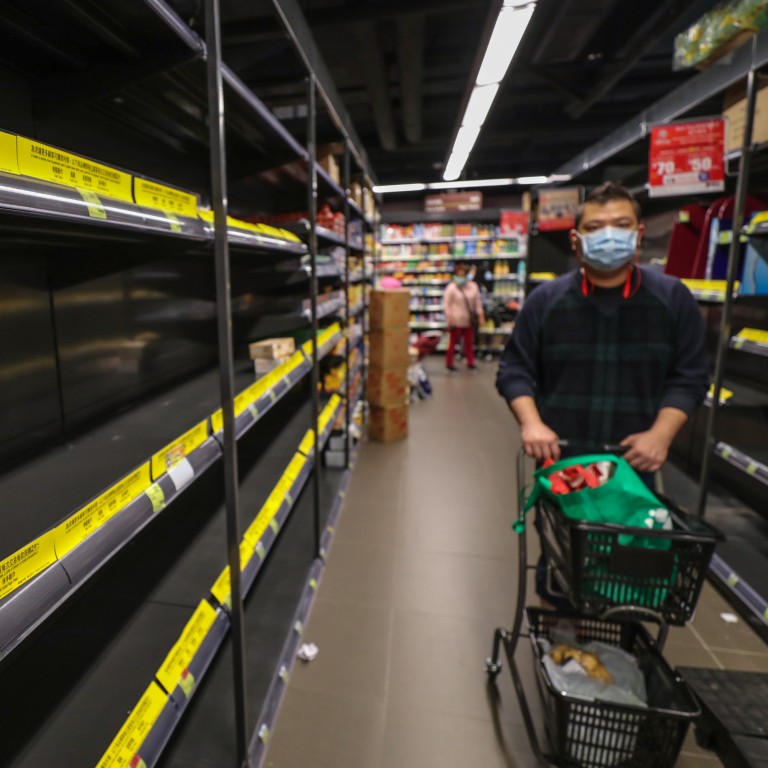
Hong Kong confirms three new cases of coronavirus infections, bringing tally to 29, with seven others testing positive
- Two of the confirmed cases are linked to the seven who tested positive, with all of them part of a larger family gathering
- Officials separately appeal for calm over panic buying sparked by fears of food shortage
Hong Kong on Sunday confirmed three more cases of coronavirus infections, taking the total tally to 29, with the new results linked to a large family gathering and an elderly man who had no recent travel history.
The health authorities said seven others who had a hotpot and barbecue meal with two of the three patients among the new confirmed cases also tested positive for the disease, but more checks were required.
“I’d suggest that the public cut down on these gatherings. If it’s necessary, try to reduce the time spent together,” said Dr Chuang Shuk-kwan, head of the Communicable Disease Branch of the Centre for Health Protection.
The family gathering linked to the two new confirmed cases – a man, 24, and his grandmother – was held on January 19 at the Lento Party Room in Kwun Tong, involving 19 people in all, including two relatives from mainland China who have since left the city.
The other new confirmed case is a 70-year-old man who has not travelled out of Hong Kong since January 9, spending most of his time at home.
The news came as Hong Kong’s top officials on Sunday assured the public that the city’s food supply was sufficient, amid the panic buying of essentials after signs of a community outbreak.
Chief Secretary Matthew Cheung Kin-chung and Secretary for Food and Health Sophia Chan Siu-chee both stressed there was no point in worrying about rice stocks and other necessities, adding that such goods were not affected by the new quarantine measures in place since Saturday.
I noticed some rumours were being maliciously spread around, only to create more chaos, as if there isn’t enough
“The government has already talked to major food suppliers, and they have publicly said that supplies are stable, so citizens should not worry,” Cheung wrote on his weekly blog.
“I noticed some rumours were being maliciously spread around, only to create more chaos, as if there isn’t enough. This will cause more panic in society. Rumours are like the virus and we have to fight them with all our might.
“Citizens should closely monitor the latest information from the government and not to be misled by rumours,” the No 2 official said.
Speaking separately on a Commercial Radio programme, health minister Chan also urged citizens not to rush to buy or stockpile rice. She said there were 25 million kilograms of rice in stock, sufficient to feed the city for about a month.
Chan noted however that suppliers and supermarkets could improve their logistics in replenishing stocks, because buyers may get worried if they see empty shelves at supermarkets and grocery stores.

As of Saturday, Hong Kong recorded 26 confirmed infections.
Despite the rising numbers, the embattled government is still facing opposition from local residents over quarantine facilities. The Hospital Authority said an air conditioner at one of its clinics in Kwai Chung was vandalised on Saturday. Police are investigating the case as arson.
Hong Kong’s ethnic minority leaders slam government over virus response
The clinic is one of the 18 facilities designated for the screening of patients with minor respiratory symptoms of infection. The authority is set to operate seven such clinics in the first phase, but has not revealed which ones would be used.
Chan said the clinics were needed for early detection of potential coronavirus cases, warning that damage to such facilities would affect the fight against the outbreak.
We appeal to the public not to oppose these clinics – your neighbours or family members may one day need them
Dr Lam Ching-choi, an adviser to the chief executive on the Executive Council, also weighed in, urging residents not to oppose plans for designated quarantine zones and clinics.
“These quarantine sites are very safe, and the distance from residential areas is more than sufficient to stop the virus from spreading,” Lam said after a television programme. “We have to have faith in science and these experts.”
The government had earlier shelved plans to use a new public housing estate in Fanling after facing strong opposition, but authorities are now eyeing a new block in a rural area of Sha Tin.
Elsewhere, residents have also protested against the use of a hostel in Jao Tsung-I Academy, which is about a 10-minute walk from Mei Foo Sun Chuen estate.
Such resistance has extended to designated clinics, which are meant for patients showing symptoms, and to relieve the burden on packed hospitals.
“We appeal to the public not to oppose these clinics – your neighbours or family members may one day need them,” Lam said.

Meanwhile, business sector lawmaker Jeffrey Lam Kin-fung, also an adviser to city leader Carrie Lam Cheng Yuet-ngor, said he and local business groups were in the process of building production lines for face masks.
He said on Sunday that the machines could be ready in four to five weeks, and were estimated to be able to produce more than 100,000 masks daily.
“I plan to supply the Hospital Authority and the underprivileged for free,” Lam said. “Cost is not a problem.”
He added that the government should intervene and regulate the price of face masks, if the surge in demand continued.

